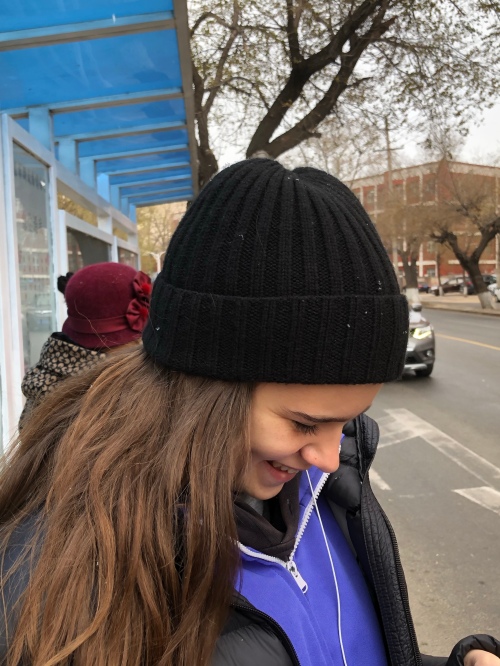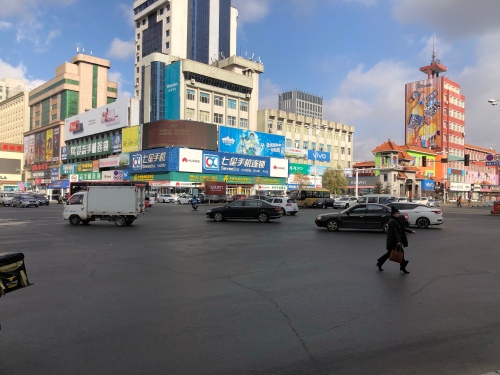Exhibit F
by afatpurplefig

In Jiamusi, we are foreigners, with a capital F. Cars slow down so their occupants can get a better look at us and pedestrians crane to get a glimpse from the opposite side of the road. There isn’t ever a time where I don’t feel many sets of eyes upon me. The elderly citizens of Jiamusi don’t even attempt to hide their amazement; they just stop dead and stare, with furrowed brows and open mouths.
It should be compulsory to spend time in a country where you are an anomaly.
Katherine is a wonder. She leads us through hotel foyers and restaurants and banks, having conversations with all those who seek to better understand the fascinating sight of three generations of tall, white women.
‘He just asked me if that was my mum and grandma’, she says, ad infinitum.
As always, food is the thing that connects everything. At breakfast, Katherine explained the seemingly-discordant instructions of ‘eat until you are full’, and ‘finish your plate’, over a meal of vegetables, black beans, eggs, unidentified pickles and I’m-going-to-call-it-bread (perhaps one day, when Katherine and I grow up, we will have our photo taken like Mum).
And lunch was at Katherine’s favourite local sushi place, where our delight in the food was easily matched by that in seeing people who know Katherine and greet her with familiarity and affection.
Later, Katherine and I waited at a bus stop, under a thousand pairs of eyes. After countless attempts at catching the falling snow in a photo, I snapped this one of the snowflakes on her hat, and spent the entire bus ride holding back tears (snow and daughter – a formidable combo).

Upon my arrival, I decided this was a city that favours the the right side of the footpath, but I now see I was mistaken. This is a city that doesn’t go in for that kind of order at all. In Jiamusi, the walk signals are decorative (as are red lights, crossings and seatbelts). Some intersections don’t even bother with them, like this one, where the pedestrians just go when and where they see fit. Because the cars often do the same thing, it doesn’t seem to matter.

The taxis beep their horns constantly, as an audio reminder that they are vacant, creating a feeling of permanent chaos. This continues if you snag one, because if there are seats free, chances are the driver will throw someone else in on the way. Someone jumped in ours, without a word about dual fares, and all worked out well.
Everything, and I mean everything, is paid for with WeChat. The transactions take place while I am still opening my purse for cash. Phones are held out momentarily, and it is done.
The streets are lined with outdoor markets, and street food stalls, and restaurants that look like family kitchens. The trickles of water from their doors are frozen. It is cold enough to want to cover your face.
Jiamusi No. 2 Middle School has 4000 students on two campuses, in years 10-12. There are 40-50 students in each class and over 300 teachers. We pass through the security gates to enter, the guard giving Katherine a huge smile and a waved arm as she goes through.
‘I’m allowed to take anyone in’, she tells us, with a grin.
We walk past the facial recognition scanners, where the teachers check in, and classrooms filled with tracksuit-clad students. They are completing their regular tests, and the school is so quiet, you can hear a pin drop. Katherine shows me the toilets, where one is required to squat in a stall that doesn’t have a door.
(The only thing to understand is why I feel about it as I do.)
Later, when they pour out of their classrooms, many of the students greet Katherine.
‘Is that your mudduuur?’
‘Bye, Kytie’
‘Ben-dan’ (‘stupid’, with affection)
I am in awe of her, this girl who flew to northern China and learned to live like a local, catching buses and ordering malatang, learning wushu and calligraphy, and understanding the Chinese way of saving face.
‘They might offer you a seat on the bus, but if you took it, then they wouldn’t have the seat any more, so you definitely shouldn’t take it.’
When I ask her what it is about Jiamusi that she likes so much, she replies,
‘It’s just my home’.












Wow, she’s so changed. The ability to make a home somewhere else in the world is an amazing one!